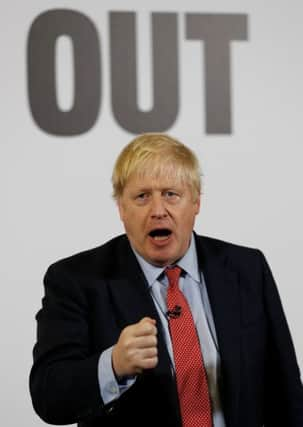Euan McColm: Johnson isn’t frightened of Andrew Neil – take the Tories’ word for it


You, in common with many others, might have been labouring under the misapprehension that the Prime Minister’s failure to meet Neil on camera during this miserable election campaign is a sign of weakness. You might have judged that Johnson is simply not up to defending his record and his promises, that he fears the sort of scrutiny in which Neil specialises.
But the truth is very different. The real reason Boris Johnson has ducked out of being interviewed by Neil is that you don’t want him to do it. You are fed up with this set-piece interview nonsense and want something new to take its place.
Advertisement
Hide AdAdvertisement
Hide AdPerhaps this is news to you. Perhaps you think you would like to have seen Johnson under the spotlight. You are mistaken. A “senior Conservative party source” confirms as much, explaining that the public has grown weary of “interviews that are all about the interviewer and endless interruptions”. What’s more, “the format is tired and broken and needs to change if it is to start engaging and informing the public again”.
So there you have it. Andrew Neil might have caused quite the stir last week when he called out Johnson for refusing to meet him on-screen but the Prime Minister’s version of events is that he isn’t scared of scrutiny, he’s simply giving the public what it wants (or, at least, not giving it what it doesn’t want).
We can, I think, be confident that none of those leaders – the SNP’s Nicola Sturgeon, Labour’s Jeremy Corbyn, the Liberal Democrats’ Jo Swinson or the Brexit Party’s Nigel Farage – who agreed to be interviewed by Neil during the campaign found it an especially comfortable experience. He’s a tenacious inquisitor with the sharpest eye for detail and a stubborn refusal to be fobbed off. An unprepared interviewee may expect to be picked apart.
Given that those who did meet Neil on air were, to varying degrees, given a good grilling, it is hardly surprising that Johnson decided against participating in an interview, but let us at least call this particular spade a spade. Johnson didn’t do the Neil interview because he was afraid. He bottled it.
This embarrassing excuse for a leader, this arch bullshitter, this grubby opportunist doesn’t for a minute think that the public is weary of seeing politicians being held to account. Rather, he knows that Neil would have (further) exposed him for the fraud he is.
Senior Tories have form for trying to spin the lie that the public doesn’t want to see scrutiny. During the 2016 EU referendum, former cocaine user and current weasel Michael Gove grandly informed the nation that people were tired of experts.
That grotesque statement was a key part of the populist campaign for Brexit. It told us that facts should be disregarded because those delivering them were not on our side.
Gove played his part in creating the climate in which a liar like Johnson can thrive. If an expert, whether she’s a doctor or he’s a BBC interviewer, raises questions about the ideology you peddle, then the expert is suspect. The expert has an agenda.
Advertisement
Hide AdAdvertisement
Hide AdGove, Johnson, Farage, Corbyn, Sturgeon (who grows more like Alex Salmond in her approach to campaigning by the day) are all populists who feel no compunction about aggressively dismissing the interventions of experts when those experts say things that don’t fit their prepared narratives.
Our senior politicians prefer their followers to adopt a messenger shooting strategy when it comes to inconvenient truths.
Supporters of Johnson will say that no journalist – not even Neil – has the right to expect any politician to submit to interrogation. This is, of course, true. But it is also true that, for our democracy to work effectively, politicians must be prepared to offer themselves up for scrutiny.
A confident, honest leader of the United Kingdom should have nothing to fear from such a process. They should have answers about policies; they should be happy to defend their records.
Johnson’s refusal to meet Neil during this campaign will have repercussions. The Prime Minister has moved the line of what is acceptable behaviour in favour of the politician.
The next time the country goes to the polls, candidates will wonder why they should bother with the awkward business of offering themselves up for scrutiny. Of course, they will conclude that it is more convenient not to do so.
Johnson – like US president Donald Trump – is driven by self-interest. He will say or do whatever he believes necessary to advance his career. Reality should not get in the way.
Whether it’s promising to build a wall along the Mexican border or insisting that post-Brexit Britain will be nothing but sunlit upland after sunlit upland, the cautionary words of informed critics must be attacked.
Advertisement
Hide AdAdvertisement
Hide AdAll that is required for the lies of these hucksters to become truths is the blind faith of supporters. And when these promises are not kept, it is not the fault of the politician. Instead, it is the fault of those who failed to believe. The lying populist is never the victim of his own deceptions but of the heresy of those who refuse to fall into line.
On Thursday, we go to the polls and every prediction is that not only will Johnson win, but that the Conservatives will have the sort of majority the Prime Minister needs to force his Brexit deal through the House of Commons.
Johnson insists he will “get Brexit done” then move on to the domestic agenda, to those policy areas which matter most to voters.
The truth is that the Brexit process will, necessarily, drag on for a very long time. And whenever the Prime Minister stumbles, he’ll point the finger at this expert or that foreign leader and tell us that blame lies with them.